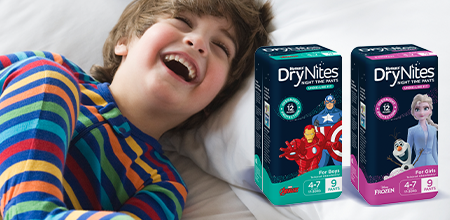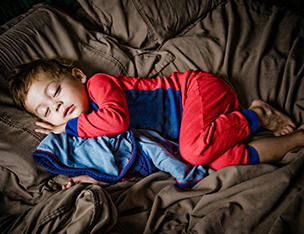The causes of enuresis are numerous and varied, so it’s helpful to familiarise yourself with them ahead of time. Knowing what to expect can help you pinpoint the causes of bedwetting and tackle them early.
Enuresis Causes
KNOWLEDGE IS THE FIRST STEP ON THE PATH TO DRY NIGHTS
What causes bedwetting?
If your child is going through a bedwetting phase, you’re probably wondering what’s causing it. The short answer is that it’s usually down to a minor developmental delay, which will straighten itself out over time. It’s quite rare for bedwetting to be caused by an underlying medical condition. The most common form of bedwetting is called primary nocturnal enuresis. This refers to when a child has never been dry at night. Common causes are things like genetics, a neurological development delay between the bladder and brain, or the underproduction of the antidiuretic hormone ADH that signals to the kidneys to produce less urine at night. The other type of bedwetting is secondary nocturnal enuresis. This refers to a child who has been dry for six months or more, and then starts to wet the bed. This is typical the result of underlying medical issues or by emotional factors. For children with primary nocturnal enuresis, it means your child’s bladder capacity has not developed to the point of being able to hold urine overnight. Children who wet the bed at night may have a nervous system that is slow to process the feeling of a full bladder. So your child does not wake up or respond to the messages sent from their bladder to their brain saying its full and needs emptying. As their body matures the messages sent from the bladder start to get through and your child learns to wake and go to the toilet. Most children who experience bedwetting haven’t reached this developmental stage yet. But don’t worry, they’ll get there soon. While deep sleeping certainly plays a role in bedwetting it is not the primary cause of why it happens in the first place. Deep sleeping just makes it even harder for children to response to the signal sent from their bladder telling them to ‘wake-up’. Secondary nocturnal enuresis is a little more complex. If your child has been dry at night for six months and they relapse back to bedwetting, it’s often a sign of emotional problems or stress. Common catalysts include big events, such as moving house, a new sibling, or starting school. Stressful situations, including tension in the home, death of a family member or pet, or being bullied at school can also cause your child to start wetting the bed again. Other causes of secondary bedwetting include minor medical conditions, such as constipation or a urinary tract infection. In very rare cases, bedwetting can be caused by diabetes. One thing to remember through all of this is that the cause is never laziness. It’s important to remain calm and not to take out any frustration on your child, even though it can be a real pain to change sheets every night. Provide some extra support to your child by using DryNites® Night Time Pants or BedMats. It gives them a little more independence and they’re an effective safety net at night.
Read transcript +Most enuresis causes will come down to physiological issues. Though enuresis can be linked to a symptom of another underlying affliction, it is more often caused by a minor developmental delay, which will straighten itself out over time. Some physiological enuresis causes include:
- Bladder control - your child’s nervous system may be slow to mature, causing bedwetting.
- Diabetes - sudden bedwetting could be a symptom of type 1 diabetes.
- Constipation - blockages in the rectum can put pressure on your child’s bladder.
- Urinary tract infection - although usually not serious, UTI’s can create a frequent need to urinate.
- Deep sleep - Understanding deep sleep is definitely an important factor when it comes to managing and treating enuresis.
While less common, emotional enuresis causes can also lead to bedwetting in your child. Reducing stress and anxiety in your child’s life can also reduce night time wetness. Look out for these emotional enuresis causes:
- Self-confidence - does your child believe in themselves?
- Happiness - if your child is constantly sad or low, they may be depressed.
- Stress - family issues, loss of life, or bullying can be difficult to deal with as a child.
- Friendships - while peers can be a good influence, they can also be a negative one.
- Bullying - as many as 1 in 6 children being bullied in some way on a weekly basis
- Depression - it’s acknowledged that one of the triggers of childhood depression can be a low self-esteem or low self-worth.
- Grief - with support, your child can make good adjustments and manage grief in their lives.
Understanding the causes of enuresis can help you better support your child. Causes can be emotional, physiological or both. Once you’ve figured out what is causing your child to wet the bed, confirm it with your doctor for the best course of action.

DryNites® Night Time Pants
DryNites® Night Time Pants are a discreet, comfortable and absorbent form of bedtime protection.

DryNites® Request a sample
DryNites® Night Time Pants help kids stay dry. Request a free DryNites® Night Time Pants sample today.






